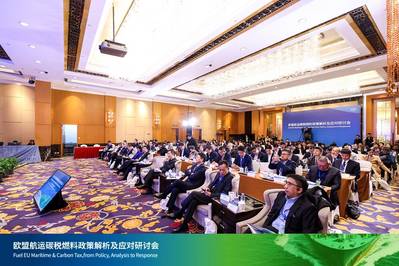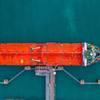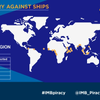China Mulls Impact of EU Regulations
On January 10, a group of over 240 shipping executives attended seminar in Shanghai on "Contributing to the China Solution to Cross the Carbon Threshold."
The aim was to further build consensus on industry development needed to respond to the challenges brought by the new EU shipping carbon tax fuel regulations.
Zhang Yong, deputy general manager of COSCO Shipping Group, shared four suggestions: first, focus on responsible investment and strive to increase low-carbon increments; second, focus on transformation finance and strive to activate high-carbon stocks; third, focus on technology upgrades and strive to improve the quality of development; fourth, focus on incentive compatibility and strive to improve the efficiency of the global shipping industry.
He believes that it is necessary to scientifically evaluate the effectiveness of emission reduction policies of all parties in accordance with the "Kaldor-Hicks compensation principle". Only when international macroeconomic policies and national regulations are coupled, and the overall social benefits are greater than the losses and compensation can be achieved, can the resource allocation between the world, regions and industries be ensured to be efficient and sustainable.
Li Guanyu, Deputy Director of the International Cooperation Department of the Ministry of Transport, believes that 2025 is a critical year for global shipping to achieve green and low-carbon transformation. He said that as a major global economy and shipping power, China has the responsibility, obligation and ability to take positive actions to promote the green and low-carbon transformation and high-quality development of the shipping industry. The Chinese government encourages and supports all shipping stakeholders to strengthen collaborative cooperation and pilot projects on specific routes to create a new model for shipping emissions reduction.
Li Zhipeng, Vice President of Shanghai Maritime University, said that green decarbonization of the shipping industry is a long and complex process that requires international consensus, technical and policy support, and the cooperation of governments, enterprises, research institutes and other institutions. Among them, professional talents and technological innovation are particularly critical in this process. The new EU shipping carbon tax fuel policy is not only a challenge, but also a major historical opportunity for the transformation of China's shipbuilding industry, new energy industry and port and shipping industry.
Mei Dewen, vice chairman of Beijing Green Exchange, said that the development of China's future industries is inseparable from the carbon market. China is promoting the construction of a more effective, more dynamic and more internationally influential carbon market by exploring diversified entities, market-oriented products and international connections.
David Loosley, Secretary General and CEO of BIMCO, said that the decarbonization problem currently faced by the international shipping industry is not only reflected in the incoordination of international and regional regulations, but also in the lack of uniformity in the definition and standards of green alternative fuels. “As the world's largest shipping organization, we call on the entire upstream and downstream industry chain to strengthen coordination and accelerate the promotion of executable and sustainable stability solutions in the context of many uncertainties at this stage, so as to gradually achieve green transformation of the entire industry.”














